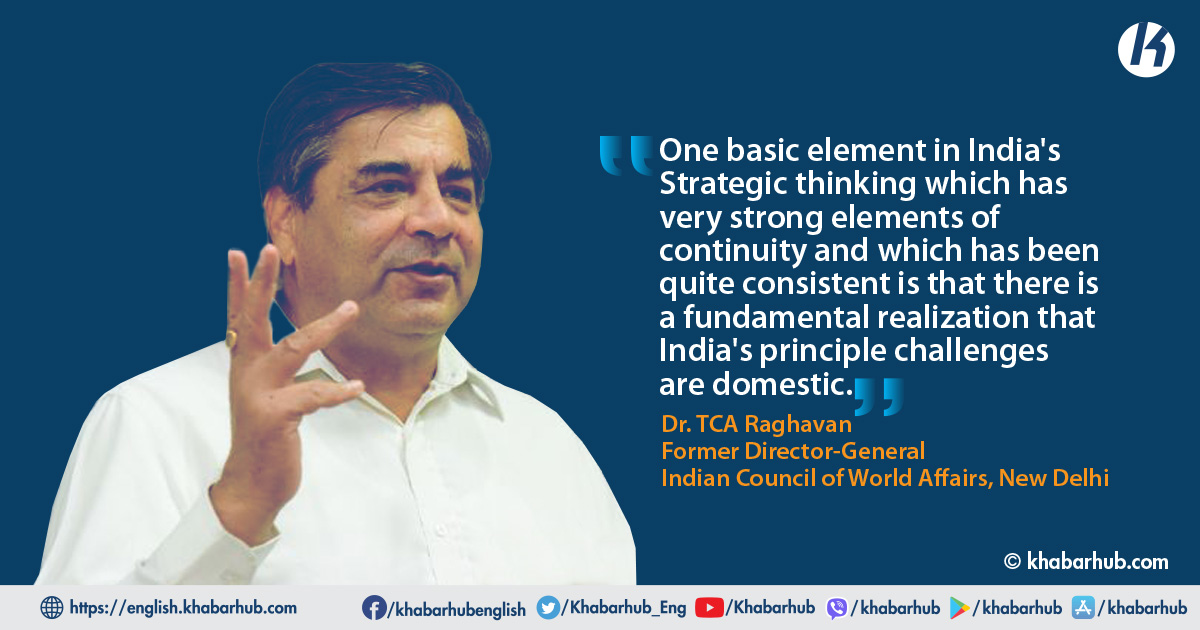KATHMANDU: Ambassador Dr. TCA Raghavan is former Director-General of the Indian Council of World Affairs, New Delhi and former Indian High Commissioner to Pakistan and Singapore.
He had earlier served as Deputy High Commissioner in Pakistan and High Commissioner to Singapore.
During his last posting in New Delhi (2007-09) in the Ministry of External Affairs, Dr. Raghavan was Joint Secretary dealing with Pakistan, Afghanistan and Iran. He has also served in Kuwait, the United Kingdom, and Bhutan.
Posts earlier held in the Ministry of External Affairs include the Director of the Office of the External Affairs Minister (2000-2003).
He was awarded a Ph.D. by the Jawaharlal Nehru University in 1992 for his dissertation relating to the economic history of India.
His current interests are historical research, strategic analysis and the diplomatic and intellectual history of modern India.
He writes, gives lectures. and participates in discussions on issues relating to Indian and South Asian diplomatic history, Pakistan, Iran, Afghanistan and South East Asia.
He has authored several books, among which his latest is entitled “History Men: Jadunath Sarkar, G.S. Sardesai, Raghubir Sinh and their quest for India’s Past” (2019).
Dr. Pramod Jaiswal, Strategic Affairs Editor at Khabarhub, spoke to Ambassador Dr. TCA Raghavan on different aspects of India’s Foreign Policy.
During her recent visit to India, U.S. Deputy Secretary of State Wendy Sherman mentioned that Washington has “no interest” in hyphenating India and Pakistan, and it does not envision building a “broad relationship with Pakistan.”. Considering that the US traditionally has viewed Pakistan as an important partner in the region, how do you view this statement?
The fact that the US – Pakistan relations are going through a troubled phase is no secret.
This is for a number of reasons and this major gap in their relationship has matured over a long period.
The principal factors are basically about the differences between Afghanistan and also Pakistan’s proximity to China.
So all of this has led to a certain jaundiced view about Pakistan in many circles in the United States including in the decision-making circles.
The recent developments in Afghanistan and Pakistan’s role in assisting the comeback of the Taliban have further reinforced this negative view about Pakistan, and to an extent, the United States is now much more cynical about Pakistan than ever before.
But at the same time, the United States is cognizant of the fact that Pakistan is a country of 200 million people.
It has nuclear weapons. It lies in an important geopolitical location and for all those reasons it will continue to deal with Pakistan.
To borrow a current phraseology that is quite popular, their relationship is going to be much more transactional at both ends than it was a decade or two decades ago.
Is there an opportunity for India to now maximize its relations with the US without worrying about the Pakistan factor?
The Pakistan factor was never that significant in the India – US interface. It had a certain role but it was never a determining factor especially where India was concerned.
United States some years ago also gave up the approach that the relations between India and Pakistan have to be balanced by the United States and it should not tilt too far in either direction.
In that sense, the current maturing of the Indo-US relationship is at least two decades in the pipeline.
I think the balancing which will inevitably be part of this relationship will also be there in the future but it is not just concerning Pakistan.
In India too, there is a feeling that while we have to have good relations with the United States and have to invest in a big way in that relationship, it can never be at the cost of other relationships.
Hence, this idea of having strategic balancing or strategic autonomy in India’s overall approach to the United States will always be present as a significant factor.
It will not be determined by the Pakistan factor but by the overall approach to global affairs which includes therefore relations with China and Russia and how India wants its posture to appear.
Overall, this balancing aspect will necessarily be a part of India – US relations for the future as well.

Is India losing its leverage in Afghanistan? What underlying challenges in India’s engagement with the new Taliban regime?
There is little doubt about the fact that the developments of August this year and the complete overthrow of the old architecture in Afghanistan was a major setback for India’s position in Afghanistan.
This is well known. To some extent, this was a setback for all those countries which had given certain importance to the architecture which was established in post-2001 in Afghanistan. India also has been in that sense a major loser in that process.
But when one looks at it in greater detail, you realize sometimes that there can be ups and downs in your overall foreign policy which are not directly related to your own policy decisions.
It can be a combination of external factors which leads to a big step up or a big step down.
So, what happened in Afghanistan in August, there was no set of things that India could have done that would have prevented or led to a different outcome.
There was a larger and more structural process at play. But one of the consequences of that process has been that India has certainly suffered a setback so has many other countries, due to a major regime change in Afghanistan.
Now we are at a position where we don’t have an embassy and we have started some contacts with the new regime, but they are still of an initial tentative nature.
Government officials have met Taliban representatives but India is still some distance away from having a relationship with the Taliban.
The process will take time because, like many other countries, India too is following a cautious and guarded approach. India is first trying to understand –
What exactly is happening in Afghanistan internally? What is the nature of this new Taliban regime? Does the Taliban have a new character once it has come back to power? There are no clear answers to these questions and India is following a cautious and guarded policy approach to that extent.
How has India’s strategic priority evolved over the years? What is India’s current ‘Grand Strategy’?
One basic element in India’s Strategic thinking which has very strong elements of continuity and which has been quite consistent is that there is a fundamental realization that India’s principle challenges are domestic.
The fact that we are a developing country and we have a huge issue of poverty, education, health, and economic development to address domestically.
This gives a certain perspective to India’s external approaches. The most significant takeaway from this is that your overall approach to foreign policy is that you want to have an environment around you that enables you to focus on your domestic priorities and challenges.
This fundamental factor has not changed. If one looks at India’s grand strategy, this has been a predominant part of the Indian Grand Strategy ever since the beginning and it remains even today.
The Foreign policy is geared towards creating an environment that will enable India to focus on domestic challenges and domestic developmental goals.
But of course, the world keeps changing and one has to adjust to the changes.
These are not of your making but one is required to adjust to them.
For instance, the rise of China in the neighborhood is certainly a new factor that we have been facing for the past decade because so far, the overall grand strategy was geared towards dealing with great powers with some distance away.
Now we have a great power that is part of our own neighborhood which means that one needs to have a fresh set of postulates when looking at the world.
Similarly, there are other changes to which one has to adjust and which are not of one’s own making like the Afghanistan situation which is a major strategic shift in the immediate neighborhood, one which we have to adjust to.
There are other kinds of such changes too. But the principal element which is very important and is often overlooked is continuity in the overall Strategic approach and that the fundamental priority is domestic and not external.
Where is India’s Neighbourhood policy headed under the Modi Government especially after the COVID19 pandemic?
The pandemic meant a brief phase but it was a phase and it was a significant phase where India’s focus was almost entirely turned inward because we were facing a pandemic that had taken an enormous domestic toll and had to be dealt with virtually whole of government approach.
So most of our energy was consumed by this domestic factor.
Now the Pandemic situation is better and we find that the traditional posture of the government which is of “Neighborhood First” is again now reasserting itself; in terms of according high priority to maintain stability in relations with each of our neighbors.
So, when we look at each of our neighbors, one will find that several initiatives have been undertaken.
There are of course some difficulties with many of our neighboring countries. But this is not something which we should be surprised about because if we look around anywhere in the world, the most difficult relationships are always the neighboring countries.
So, it is a fact that India often has frictions and has gone through difficult times with each of its neighbors.
There is not a single neighbor that doesn’t go through patches or great difficulty.
But this is like things when you have a combination of influences that exist in South Asia today.
I think the easing of the Pandemic will continue. The domestic focus will now shift slightly and we will be reverting to our traditional posture of having deep engagement with each of our neighboring countries.
China recently delivered the largest and most advanced warship to Pakistan that the country has ever exported. How do you view this move?
Well, this China-Pakistan relationship is not new as far as India is concerned. In many ways, it is a factor that has been presented as a constant in Indian foreign policy at least for 50-60 years.
So whether it is the question of arms transfer or whether it is the question of alignment of policies, these are not new developments per se.
The new factor is the enormous economic development that China has been able to compress into a short period of time and the fact it is now a major power in a neighborhood.
This enormous change in China’s position has meant that it has impacted all our relations in South Asia, not just Pakistan.
People tend to focus more on Pakistan but it had an enormous effect on each of our neighboring countries’ relations whether you take Bangladesh or you take Nepal or you get Sri Lanka, every one of them has been profoundly impacted by the size of China.
So, I would see the India-Pakistan-China triangle in that larger framework. The China-Pakistan relationship is not a new factor that we had to deal with.
Secondly, there is a general phenomenon related to China that is not just specific to Pakistan.
The only way forward for India is to continue to invest in its relations with China while being mindful of all the security and other related issues which exist with China today.
At the same time try to stabilize relations with Pakistan to the extent possible in a relationship that is deeply adversarial and has numerous friction points each of which has a long historical background.
Is China attempting to be Pakistan’s all-weather strategic partner and emerge as the biggest weapons supplier for the Pakistani military?
I think so. China has always prided itself on having stable relations with its neighboring countries and I think they invested a great deal in Pakistan for several decades.
So yes, I think both China and Pakistan give a great deal of importance to their bilateral relationship, and certainly, there is an element of strategic calculation from both ends in this relationship.
Because in the end, all countries pursue relationships in terms of their national interest.
So, for Pakistan, the relationship with China has an even deeper significance today because it faces as I mentioned earlier a very difficult patch in its relations with the United States. There are continuing difficulties with India.
In this context, it sees China as a Bulwark of its foreign policy. China similarly because it sees the growing relationship between India and the United States, sees the United States as a major Strategic competitor and it also understands the geopolitical position of Pakistan.
I think there is an element of Strategic calculation that they see Pakistan as a factor that helps in keeping India in some kind of balance.
So certainly, from both ends, there is congruity of national interest which means that both give a great deal of importance to this relationship.
How has the strategic importance of the South Asian region changed over the years?
South Asia has always been of certain strategic importance. Because it straddles to oceans, it has a very strategic position in the Indian Ocean it is a region with a huge population, and so on.
In recent years, the significance of South Asia also comes from the fact that it is a region adjoining China.
The rise of China and military adhesion of China gives the region around China a new significance and added dimensions.
I think in that context the significance of South Asia is evolving. From a South Asian perspective, the most significant change which occurred in its overall position is because of the China factor.
And certainly, for India, this is a very profound change because historically our position was always keeping great powers out of South Asia, not just as India’s national interest but also as the interest of each of our neighboring countries because if we get caught up in extra-regional or regional conflicts, the focus shifts away from national development and economic development which is the key priority for each of the South Asian countries.
Now Pakistan will always to some extent outlier in this because alone in South Asia, Pakistan became involved in extra-regional military pacts such as CETO SENTO and so on.
From the 1950s it cemented a very strong relationship with the United States, in the 70s and 80s and thereafter from the late 1990 and especially in the century, it has cemented a very similar relationship with China.
So to that extent, it was an outlier. But overall India’s approach was always that we should try to keep South Asia isolated from extra-regional and great power contestation.
But I think this calculation and this approach have to change because as I said earlier, it’s no longer a question of keeping strong powers out of South Asia, we now have great power in South Asia in the form of China.
So, what direction South Asia will take depends, therefore, a great deal on how relations between India and China will evolve and equally on how relations between different South Asian countries and China and India will evolve.
In that sense, South Asia today is poised at a somewhat significant strategic movement.









Comment